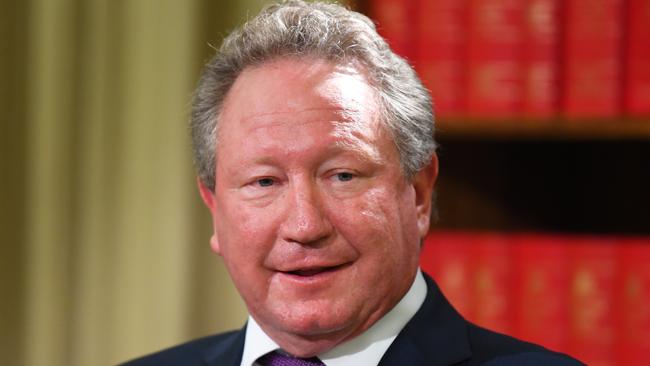Coronavirus: Health officials bar FOI request on Andrew Forrest’s China deal
Health officials have refused to release correspondence with Andrew Forrest’s private foundation on its role in sourcing 10 million coronavirus tests from China.

Health officials have refused to release correspondence with Andrew Forrest’s private foundation on its role in sourcing 10 million coronavirus tests from a Chinese genetics company linked to human rights abuses.
The Department of Health ruled that 27 pages of communications with the mining magnate’s Minderoo Foundation on the $250m deal with China’s BGI Group were exempt from release, after a Freedom of Information request by The Australian.
The department said making the documents public could adversely affect the nation’s dealings with foreign governments and companies, and damage the business interests of the firms involved.
Their release could also threaten Australia’s national security by revealing information about the National Medical Stockpile, it said.
In its decision, the department said “a third party” – the Minderoo Foundation – argued that “the documents should be exempt” from release.
Mr Forrest declined to comment specifically on the documents sought, but told The Australian on Tuesday his foundation had responded an urgent request from the government to help obtain the tests.
“Minderoo acted in Australia’s best interests, and risked considerable capital, to be able to safeguard Australia from the type of COVID-19 crisis now being experienced in Victoria, and was humbled to be able to serve the Australian people at the government’s firm request,” the mining magnate said.
Seven items of correspondence between the parties were identified by officials but kept secret, in response to The Australian’s FOI request.
They began with a March 3 letter from then-Health secretary Glenys Beauchamp to Minderoo, and concluded on April 4 with a document finalising the initiative.
Opposition health spokesman Chris Bowen said the public had a right to see the full details of the arrangements to secure the coronavirus tests.
“Australians deserve transparency about the handling of the COVID crisis and transparency about contractual arrangements, particularly in regards to large sums of money,” Mr Bowen said.
BGI last month had two of its subsidiaries black-listed by the US Department of Commerce over alleged involvement in human rights abuses against China’s Muslim minorities.
Xinjian Silk Road BGI and Beijing Liuhe BGI were among 11 Chinese companies added to the US Entity List for activities contrary to its foreign policy interests.
Secretary of Commerce Wilbur Ross said the companies were linked to “involuntary collection of biometric data … from the Xinjiang Uighur Autonomous Region”.
Mr Forrest’s involvement in securing the testing equipment sparked controversy when he invited a Chinese diplomat to an April press conference with Health Minister Greg Hunt to announce the deal with BGI.
At the time, Mr Forrest said his personal relationship with BGI Group founder Wang Jian had helped seal the deal.
Mr Hunt’s office said high-level security advice was obtained on the risks of allowing the Chinese company to undertake the sensitive work.




To join the conversation, please log in. Don't have an account? Register
Join the conversation, you are commenting as Logout